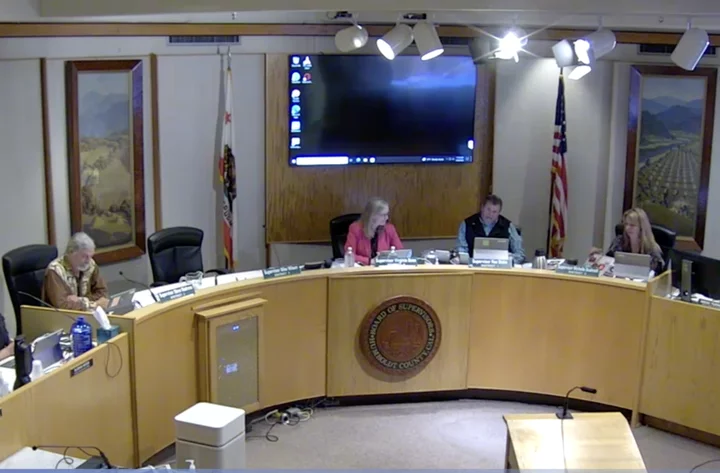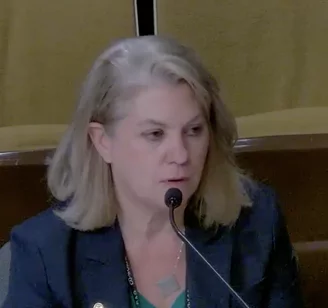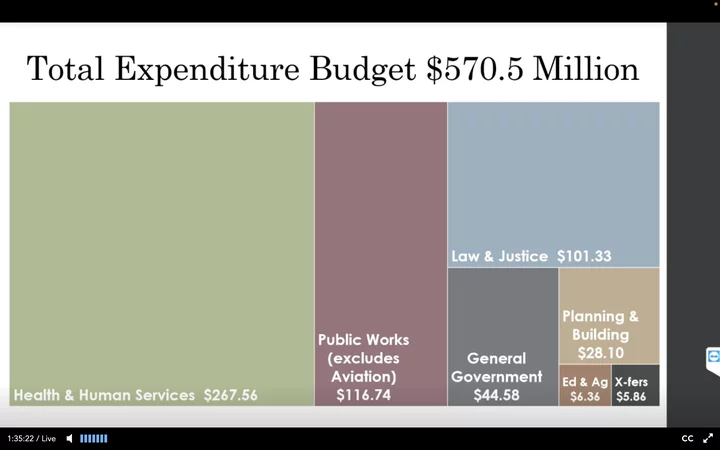
The Humboldt County Board of Supervisors, with Third District Supervisor Mike Wilson absent. | Screenshot from Tuesday’s meeting.
###
Humboldt County’s well-documented backlog of delinquent fiscal reporting has left county administrators in the dark, unable to adequately plan for the future because they lack a clear view of the present.
That’s the picture that emerged during a budget hearing in Tuesday’s Board of Supervisors meeting, and County Administrative Officer Elishia Hayes did not mince words.
“When we tell you we don’t know how much money you have, that is very serious and somewhat dire,” Hayes told the board. “We don’t know if we have $30 million in the bank or if we’re negative $30 million in the bank.”
Because of this uncertainty, she said, the county is not in a good position to adopt a final budget for the upcoming 2022-23 fiscal year, as it would normally do this time of year. Instead, at staff’s recommendation, the board agreed to implement a three-month hiring freeze and approve a “recommended” budget that will serve as a placeholder until September, by which time staff hopes to have a clear enough picture of the county’s financial position to bring forward a final budget for approval.

Miller
Tabatha Miller, assistant county administrative officer and chief financial officer, said there are other budgeting challenges this year, including a loss in revenue stemming from the board’s decision in February to slash cannabis cultivation taxes and added expenses from its decision to raise employee salaries and benefits, which was done in hopes of improving recruitment and retention.
Miller said exceptions can be made to the hiring freeze to bring on employees for “essential and critical open positions,” and she explained that the County Administrative Office will make the call on what’s “essential and critical,” in collaboration with the human resources director.
“What is considered essential and critical open positions?” Second District Supervisor Michelle Bushnell asked.
Miller said it could be positions that are essential to public safety or positions in departments that are woefully short-staffed, including the Auditor-Controller’s Office, which is responsible for the vast majority of fiscal reporting.
Miller also said the county is using its second infusion of American Rescue Plan Act (ARPA) funds — $26.3 million — to help right the ship, “making sure that we shore up the county’s fiscal position and using that [money] to sort of replace some of the lost revenues and expenses that you all have paid over the last couple of years.
The proposed budget calls for a record $570.5 million in expenditures, with 47 percent allocated to the Department of Health and Human Services, 20 percent going to Public Works and 18 percent going to Law and Justice.

Screenshot of a slide from Tuesday’s budget presentation.
Grants from the California Department of Cannabis Control totaling $18.6 million helped beef up the Planning and Building budget by nearly $11 million, Miller said. The county’s biggest spending increase — $27.7 million — comes via wages and benefits, which account for 10.3 percent of the total spending budget.
Meanwhile, the county plans to reinstate two percent department contributions to Public Agency Retirement Services (PARS), which became a source of dispute between the County Administrative Office and Auditor Controller Karen Paz Dominguez. Miller said the contributions will help offset the county’s long-term pension liability.
The recommended budget also called for a $5 million contribution to the general services fund, nearly doubling the balance to $9.7 million. “And this is really about rebuilding our fiscal reputation and our financial sustainability,” Miller said. “It’s about building up reserves so we’re ready for a rainy day.”
Rebuilding those fiscal reserves will also improve the county’s credit, she said, “so that in a couple years when you go to your outside municipal rating agencies to look at borrowing money, we’ve got some things in place that show that we really are strong financially.”
DHHS Director Connie Beck expressed concern about the proposed hiring freeze. She said her department is currently recruiting for a number of vacancies, “so if there’s certain ones that we need to be held, we need to know that,” she said. “There are vacancies in our department all over the place. In some areas we have a 40 percent vacancy rate.”
Hayes assured her that recruitments already in progress will not be subject to the hiring freeze. Miller added that the freeze amounts to a “holding pattern” that could keep the county from having to fire people in a few months, not long after they’ve been hired.
“Our hope is we’ll bring back better information and better news” in September, she said.
First District Supervisor Rex Bohn suggested that department heads might be better at determining who’s essential and critical rather than the CAO’s Office. Hayes countered that while her office will certainly collaborate with other departments, it’s essential to pause and “get a grip on our finances.”
To this point in the conversation, nobody had explicitly pointed the finger at the Auditor-Controller’s Office. Bohn took the opportunity to address the elephant in the room.
“We’re coming out of … four years of a financial cluster, of things not being done, things not being turned in and staff turnover in a department that we needed so much help in,” he said. “And it has left such a black cloud. … Basically we’re teetering on an edge and I hate to say it, [but] ARPA funds … may be the only thing that saves us at the end of the day. And that’s a terrible thing to say.”
Mixing metaphors, he continued, “We’re hoping that the light at the end of the tunnel isn’t an oncoming train, but we won’t know what’s out there ‘til we actually start peeling the onion back. And it’s a scary, scary situation. … It’s just a fiscal nightmare we’re in. It took four years to get us here, and it’s going to take us more than that to get us out of [it].”
Bushnell voiced concern about impacts to the Planning and Building Department, noting that “an enormous amount” of planner positions are currently vacant.
“I don’t know if you guys consider that as central, but that’s central to my district,” Bushnell said. “And it stops everything in its tracks. So while I understand [the freeze request], it gives me a little bit of heartburn.”
Hayes held her ground. “This is not something I enjoy bringing before your board,” she said. “Nor are these conversations fun to have with the department heads.” But expenses have risen with equity adjustments and cost-of-living adjustments for employees in every department.
“I’m asking for a pause … ,” Hayes said. “For three months. Give us three months to work through this information so that I can make good recommendations to you. Will it be a hard three months? Yes. But it’s not a year. It’s not two years. It’s not doing layoffs.”
Bushnell wound up making the motion to accept staff’s recommendation for the placeholder budget and hiring freeze, “however reluctant I am,” she added.
Fifth District Supervisor Steve Madrone seconded the motion, though he noted his own reluctance over the hiring freeze. With Third District Supervisor Mike Wilson absent, the board approved the motion unanimously, 4-0.
CLICK TO MANAGE